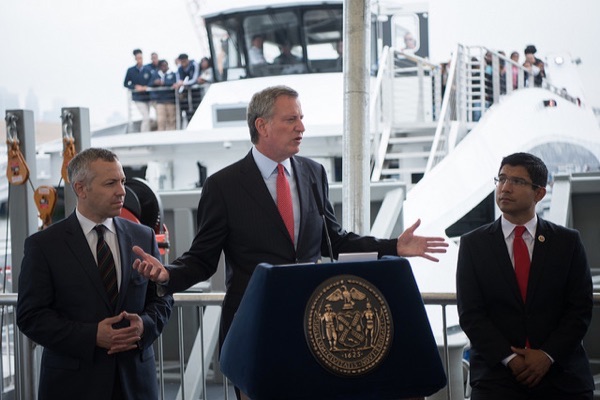One of New York City’s preeminent jurists, Frederick A.O. Schwarz Jr., affirmed today that the city possesses full legal authority to toll its own roads and bridges and thus does not require state approval to implement congestion pricing.
Schwarz, chief counsel of the Brennan Center for Justice at NYU Law School, was director of the NYC Law Department from 1982 to 1986 and later chaired the New York City Charter Revision Commission and the New York City Campaign Finance Board. His support for home rule tolling, expressed in an op-ed in Crain’s New York this morning, lends more weight to the conclusion that Mayor Bill de Blasio can overhaul New York's dysfunctional toll regime without concerning himself with the many veto points in Albany.
There are now two versions of the Move NY toll reform plan: one that sets a uniform toll to enter Manhattan below 60th Street while lowering tolls on MTA crossings, which would require an act of the legislature; and a city-only model with no toll swap, which could be enacted by the City Council.
Schwarz and his co-authors -- Hofstra Law School Dean Eric Lane and NYU Law Professor Roderick Hills, Jr. -- trace the origins of the city’s legal authority to a 1950s toll proposal that ran afoul of Robert Moses:
The Legislature passed the law after a blue-ribbon commission, appointed by Mayor Robert Wagner and Gov. Averell Harriman and chaired by banker and civic leader Benjamin Buttenwieser, recommended in 1956 that the state create a new public authority to take over the city’s roads and bridges and finance them with toll revenue. While good-government groups praised the plan, Robert Moses denounced it as an attack on his own Triborough Bridge & Tunnel Authority. Caving in to Moses, the Legislature instead bestowed a new power on the New York City Council to impose tolls on the use of highways “authorized by law.”
They conclude that "authorized by law" must refer to city, not state law, or else the clause would essentially be meaningless. (Interested readers may wish to consult Professor Hills’ law memorandum detailing this and other fine points of law.)
Schwarz’s imprimatur is significant because of the haze of denial that has enshrouded the home-rule option.
At a City Council hearing last month, City DOT Commissioner Polly Trottenberg deflected questions about the idea, saying, “Many attorneys over a number of administrations have looked at this question very carefully. They all determined that the city doesn’t have the legal authority, that we need to get that authority from the state.” That same day, de Blasio insisted that “The only way congestion pricing can even be considered is through Albany. That’s what has been determined by the Law Department long ago.”
Schwarz, Hills, and Lane dispute those dismissals:
We … scholars of New York City law … know of no public corporation counsel opinion defending the Albany-only view of the 1957 law. Indeed, there has been no publicly reasoned defense of such abdication of city power at all, just bland assertions by city officials that unnamed city lawyers have decided for reasons unknown that the city has no powers whatsoever.
While the authority to fix subway service rests with the governor, a mayor looking to tackle New York's mounting traffic and transit problems could make tremendous strides by enacting congestion pricing via home rule.
The city-only version of the Move NY plan envisions $2.75 car tolls to enter and exit the Manhattan central business district (via the East River bridges and across 60th Street), with an equivalent surcharge for cabs and app-based for-hire vehicles making pick-ups in the CBD. Here are some of the notable anticipated effects:
- Bus service could be significantly improved, owing to the predicted 10 percent gain in Manhattan traffic speeds and the opportunity to use the reduced car volumes to carve out functional bus lanes.
- A similar dynamic, buttressed by safety-in-numbers, would make bicycling safer and more widespread. Moreover, some of the toll revenues could pay to build out bike-share throughout the city.
- Toll revenues could also finance the Riders Alliance’s popular “fair fares” proposal to help low-income households afford subway and bus travel.
- The taxi surcharge would reduce demand for and supply of Ubers and yellow cabs within and near the Manhattan core, countering the upsurge of for-hire vehicle trips that is the primary cause of the 15 percent slowing of CBD traffic cited by Trottenberg in her testimony to the City Council last month.
While these gains would be impressive, there could be an even bigger payoff if elected officials and civic leaders begin to rally behind congestion pricing. An upwelling of interest could put the lie to Governor Andrew Cuomo’s constant (and circular) refrain that a lack of political support prevents him from backing congestion pricing proposals such as Move NY.
The prospect of New York City charging tolls on its own -- and commandeering the toll revenues -- could be just the ticket to force the governor to take seriously the Albany version of Move NY -- which would do more to reduce traffic and raise revenue for transit.






